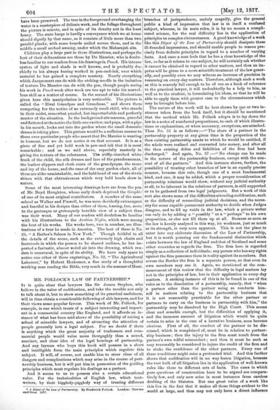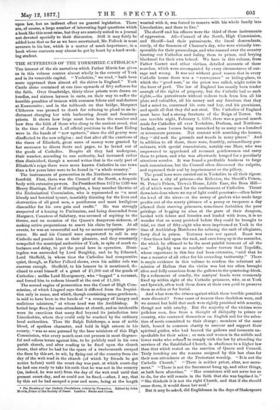MR. POLLOCK'S LAW OF PARTNERSHIP.*
1r is quite clear that lawyers like Sir James Stephen, who believe in the value of codification, and-take the trouble not only to talk about it, but to show something of its practical usefulness, will in time obtain a considerable following of able lawyers, and for their views some popular favour. This work of Mr. Pollock, for -example, is one which treats of a subject interesting and import- ant in a commercial country like England, and it affords an in- stance-of what has been said above of the possibility of raising a school of scientific lawyers, and of attracting the attention of people generally into a legal subject. For we doubt if there is anything which the great majority of tradesmen and com- mercial people would value more thorgughly than a sound, succinct, and dear idea of the legal bearings of partnership. And any layman who buys this book will possess in a short and intelligible form the main principles which regulate this subject. It will, of course, not enable him to steer clear of all dangers and complications which may arise in the course of part- nership business, but it will put him in possession of the guiding principles which must regulate his dealings as a partner.
And it seems to us to possess also a certain educational value. For the technicalities of English law, which text- writers, by their higgledy-piggledy way of treating different
• A Digest of the Late of Parrlosership. By Frederick Pollock. London: Stevens end Bons. BBL branches of jurisprudence, unduly magnify, give the general public a kind of impression that law is in itself a confused subject, whereas, in its main rules, it is by no means a compli- cated science, for the real difficulty lies in the application of principles to complex circumstances. A good knowledge of a work like this Digest of the Law of Partnership should dissipate these ill-founded impressions, and should enable people to reason pre- cisely from definite principles in regard to a number of varying facts. And once a man feels that he has a clear knowledge of the law, so far as it relates to one subject, he will certainly ask whether it cannot be obtained in regard to other matters, and thus an im- petus will be given to a more scientific treatment of the law gener- ally, and possibly even we may witness an increase of precision in reasoning on every-day matters. Therefore, although such a work as this is scarcely full enough to be of use as a book of reference to the practical lawyer, it will undoubtedly be a help to him, as well as to the student, in formulating his ideas, so that he will be able to apply them with greater ease to the circumstances which may be brought before him.
The nature of the work will be best shown by one or two in- stances taken from the book itself, but it should be mentioned that the method which Mr. Pollock adopts is to lay down the law in a series of numbered propositions, to each of which illustra- tions or explanations, or when necessary, exceptions, are attached. Thus No. 31 is as follows :—" The share of a partner in the partnership property at any given time is the proportion of the then existing partnership assets to which he would be entitled, if the whole were realised and converted into money, and after all the then existing debts and liabilities of the firm bad been discharged." And again, No. 37 :—" No change can be made in the nature of the partnership business, except with the con- sent of all the partners." And this instance shows, further, the possibility of treating other branches of law in an equally precise manner, because this rule, though one of a most fundamental kind, and one, it may be added, which a proper consideration of partnership relations would show, without any judicial authority at all, to be inherent in the relations of partners, is still supported or to be gathered from two legal judgments. But a work of this sort also shows some of the difficulties attending codification, such as the difficulty of reconciling judicial decisions, and the neces- sity for some capable paramount authority to decide when Judges disagree, and to fill up voids in the law, which a private writer can only do by adding a " possibly " or a " perhaps " to his own proposition, or else not fill them up at all. Because as soon as the law is keenly analysed in this way, its weakness, just as much as its strength, is very soon apparent. This is not the place to enter into any elaborate discussion of the Law of Partnership, but it is worth pointing out the fundamental distinction which exists between the law of England and that of Scotland and some other countries as• regards the firm. The firm here is regarded simply as a collection of individuals ; any person who has any rights against the firm possesses them in reality against its members. But across the Border the firm is a separate person, so that even its own members may sue it. Again, we mentioned at the com- mencement of this review that the difficulty in legal matters lay not in the principles of law, but in their application to every-day matters. A striking instance of this is to be found in one of the rules as to the dissolution of a partnership, namely, that "when a partner other than the partner suing so conducts him- I self in matters relating to the partnership business that it is not reasonably practicable for the other partner or partners to carry on the business in partnership with him," the partnership may be dissolved by the High Court. This seems clear and sensible enough, but the difficulties of applying it, and the immense amount of litigation which would be quite certain to arise in the case of a lucrative business, soon become obvious. First of all, the conduct of the partner to be die- ' missed, which is complained of, must be in relation to partner- ' ship business ; then the injury to the firm must result from the partner's own wilful misconduct ; and then it must be such as may reasonably be considered to injure the credit of the firm and to shake the confidence of the other partners. Every one of these conditions might raise a protracted trial. And this further shows that codification will in no way lessen litigation, because the vast bulk of all litigation lies in the application of well-known rules like these to different sets of facts. The cases in which pure questions of construction have to be argued are compara- tively few, and only now arise in most instances from careless drafting of the Statutes. But one great value of a work like this lies in the fact that it makes all these things evident to the world at large, and thus may not only have a direct influence upon law, but an indirect effect on general legislation. There are, of course, a large number of interesting legal questions which a book like this must raise, but they are scarcely suited to a journal not devoted specially to their discussion. Still it may fairly be added here that so far as we have ascertained, Mr. Pollock is moat accurate in his law, which is a matter of much importance, in a book whose contents may almost be got by heart by s hard-work- ing student.



































 Previous page
Previous page